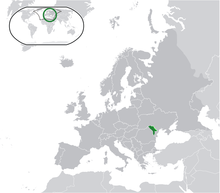LGBT rights in Moldova
| LGBT rights in Moldova | |
|---|---|

Location of Moldova (green) – Transnistria (light green)
on the European continent (green + dark grey) |
|
| Same-sex sexual activity legal? | Yes, since 1995 |
| Gender identity/expression | Yes, right to change legal gender |
| Military service | Gays and lesbians allowed to serve |
| Discrimination protections | Sexual orientation protections in employment (see below) |
| Family rights | |
| Recognition of relationships |
No recognition of same-sex relationships. |
|
Restrictions:
|
Same-sex marriage constitutionally banned. |
| Adoption | – |
Lesbian, gay, bisexual, and transgender (LGBT) persons in Moldova may face legal challenges not experienced by non-LGBT residents. Since the fall of the Soviet Union, Moldova has come increasingly under the influence of the Orthodox Christian church. It has also been marred by human rights violations against the freedom of association for LGBT to have Gay Pride demonstrations.
Since 1995, homosexuality between consenting adults in private has been legal in Moldova. In September 2002 new laws were introduced equalising the age of consent.
No recognition with respect to same-sex marriage or civil unions is currently legal. Constitution bans same-sex marriage.
For a long time, a large coalition of human rights organisations, including Information Centre GenderDoc-M, was lobbying the government for implementation of anti-discrimination legislation in line with European standards, which would include sexual orientation as one of protected grounds.
A bill, which bans discrimination on the basis of sexual orientation in employment, was adopted by the Moldavian Parliament on 25 May 2012 and signed into law by the country's president Nicolae Timofti on May 28, 2012. The law took effect on January 1, 2013.
The main gay and lesbian campaigning group is called GenderDoc-M, which seeks to support gays and lesbians within Moldova.
Moldova has a rather small but lively and open-minded gay scene. Chisinau's first gay club – Jaguar Dance and Music Club—opened in 2009. Moldova’s first Gay Pride was held in April 2002, but it was banned in 2007, because homosexuality is said to be undermining the Christian values of the country.
Moldovan society still remains very homophobic. For example, virulent homophobic statements are casually made by politicians and lesbians and gays are routinely discriminated against. Violence towards the gay community is not unknown.
Scott Lively, a vociferous opponent of gay rights who has linked homosexuality to having played a part in the spawning of the Rwandan Genocide and the Holocaust, visited Moldova in 2010 to oppose an anti-discrimination measure. The bill had passed through committee twice before stalling subsequent to opposition from the Communist Party of Moldova, which cited Lively's visit as a reason for its opposition.
...
Wikipedia
